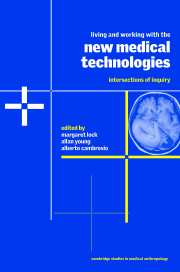Book contents
- Frontmatter
- Contents
- List of contributors
- 1 Introduction
- Part I Epochal transitions? Biomedicine and the transformation of socionature
- Part II Laboratories and clinics: the material cultures of biomedicine
- 4 Trustworthy knowledge and desperate patients: clinical tests for new drugs from cancer to AIDS
- 5 Pathology and the clinic: an ethnographic presentation of two atheroscleroses
- 6 “Real compared to what?”: Diagnosing leukemias and lymphomas
- 7 History, hystery and psychiatric styles of reasoning
- Part III Technologies and bodies: the extended networks of biomedicine
- Index
5 - Pathology and the clinic: an ethnographic presentation of two atheroscleroses
Published online by Cambridge University Press: 23 December 2009
- Frontmatter
- Contents
- List of contributors
- 1 Introduction
- Part I Epochal transitions? Biomedicine and the transformation of socionature
- Part II Laboratories and clinics: the material cultures of biomedicine
- 4 Trustworthy knowledge and desperate patients: clinical tests for new drugs from cancer to AIDS
- 5 Pathology and the clinic: an ethnographic presentation of two atheroscleroses
- 6 “Real compared to what?”: Diagnosing leukemias and lymphomas
- 7 History, hystery and psychiatric styles of reasoning
- Part III Technologies and bodies: the extended networks of biomedicine
- Index
Summary
Hospital Z is a university hospital in a medium-sized town in the Netherlands. It differs in specific ways from other hospitals, but if one wants to study the form modern medicine takes in an affluent welfare state it is no better or worse than many others. In this chapter I will report on a study I conducted in hospital Z. This study was partly ethno-graphic. For several years I regularly went to this hospital and visited various departments in order to investigate the diagnosis and treatment of atherosclerosis of the leg vessels. The main aim of the study, however, was not to map faithfully what happens in the course of diagnosing and treating this single medical problem. Instead it was philosophical. I wanted to contribute to the crafting of better terms for analyzing the relations between medical knowledge and its objects.
In this chapter I'll present some of my findings – or maybe I should say some of my inventions. More specifically, I will present knowing not as a faculty of the human mind, but as an activity of the human body and the instruments it puts to use. This implies a shift in status for the objects of knowledge. Instead of being in the point of focus for a variety of eyes, each with their own perspective, they are presented here as objects that are being handled – by hands and knives; by questioning and listening; by coloured dyes and patient files.
- Type
- Chapter
- Information
- Living and Working with the New Medical TechnologiesIntersections of Inquiry, pp. 82 - 102Publisher: Cambridge University PressPrint publication year: 2000
- 10
- Cited by



